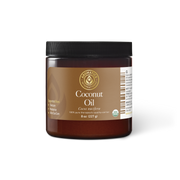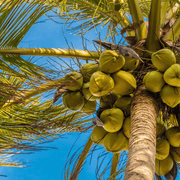Coconut oil is one of the most popular natural aromatherapy products.
You can use it alone—right out of the jar!—to moisturize and protect your skin. It also makes a perfect carrier for essential oils, and it blends easily with other butters, oils, and carriers. It’s incredibly versatile!
What is coconut oil?
Coconut oil is pressed from the flesh of coconuts in the tropics of Mexico.
Coconut oil has a silky, smooth texture and absorbs easily into the skin. In warm temperatures, coconut oil is loose and liquidy. In colder temperatures (or if you store it in the fridge), it turns solid and white. Both states (liquid and solid) are safe for skin and resist rancidity. And both states have a fresh, tropical aroma!
Refined, fractionated & virgin coconut oil
Coconut oil pressed from unprocessed, fresh coconut “meat” is called “virgin” (or unrefined coconut oil). “Refined” coconut oil (or processed coconut oil) is usually made from dried coconut meat that’s undergone processing to adjust its properties and reduce its aroma.
Coconut oil can also be “fractionated,” meaning it’s been heated beyond its melting point. This causes some of the saturated fatty acids in the oil—you might say a “fraction” of them!—to stay in liquid form even when they’re cooled. At Aromatics, our coconut oil is certified organic, extra-virgin, and unfractionated! You can even cook with it... or eat a tablespoon of coconut oil directly from the jar!
The difference between virgin & extra virgin
In aromatherapy, the quality of carrier oils is crucial, much like the importance of high-grade essential oils. Extra virgin coconut oil (EVCO) and virgin coconut oil are both cold-pressed and unrefined, preserving their natural nutrients and high antioxidant content. These qualities make them excellent carrier oils for enhancing the therapeutic effects of essential oils. While the term "extra virgin" is more of a marketing distinction and both types are quite similar, they remain practical and affordable choices for general skin applications and massage blends. The choice between them can slightly influence the effectiveness and benefits of aromatherapy blends, but both offer substantial benefits.
Cooking with coconut oil, medium chain triglycerides, and saturated fat
Cooking with coconut oil has become increasingly popular in recent years, and for good reason! Not only does it add a delicious tropical flavor to dishes, but it also boasts numerous health benefits. It is rich in medium-chain triglycerides (MCTs), which are easily metabolized by the body and can be used as an immediate source of energy. It also contains lauric acid, a fatty acid that has been shown to improve cholesterol levels and reduce inflammation. Additionally, research suggests cooking with coconut oil may help boost your heart health and improve brain function. With all of these amazing benefits, it's easy to see why it should have a place in every kitchen! It has a relatively high smoke point of around 350°F (175°C), making it a great option to use coconut oil for high-heat cooking methods like frying and sautéing.
Coconut oil is considered a saturated fat. In fact, it is one of the most highly saturated fats available, with around 90% of its fatty acids being saturated. However, recent research has shown that not all saturated fats are created equal and that some types may actually have health benefits. As mentioned earlier, it contains medium chain fatty acids (MCTs), which are metabolized differently than other saturated fats and may have positive effects on metabolism and weight loss.
Safety tip! We don’t recommend coconut oil consumption when it has essential oils blended into it. Using essential oils internally requires specific training to ensure safety.
Extra virgin coconut oil science
Coconut oil contains more lauric acid than any other plant-based butter or oil.
The lauric acid content makes it super-soothing for dry, irritated, and damaged skin (especially skin that’s been burned), and even helps protect vulnerable skin from germs. (Lauric acid has purifying effects.)
Organic coconut oil is also rich in myristic acid which can soothe muscles and joints, and the antioxidant vitamin E, making it helpful for repairing damage and reducing signs of aging.

Uses & benefits of coconut oil
As a moisturizer, it deeply penetrates and softens the skin (it’s an emollient), and it’s gentle enough even for sensitive skin. It protects your skin’s barrier, meaning it helps your skin retain valuable moisture while preventing damage from environmental issues—like the weather, pollution, and harsh chemicals that may be in your home.
It can soothe irritated, itchy, or damaged skin, and it’s a popular choice for some people who struggle with ongoing skin issues. Just make sure to test it on a small area of your skin before using it more extensively. A small amount goes a long way! Just a dab on your fingertip can cover your whole arm.
Your hair will love coconut oil, too! Try working a small amount between your hands and using it as a leave-in hair conditioner, or use a bit more for a deep conditioning treatment that you wash out.
Coconut’s antioxidant properties make it a valuable anti-aging oil, too. It works well in creams for mature skin.
It also makes a soothing ingredient for homemade muscle butters and joint care salves. Try blending a few comforting essential oils into pure coconut oil, like juniper berry oil (Juniperus communis) and ginger oil (Zingiber officinale), and gently massaging your muscles and joints.
While some people apply coconut oil for acne care (it can purify the skin), others say it clogs their pores. Everyone’s skin is different! While coconut oil is typically mild and light enough for the body, you might want to test it by applying coconut oil to a small area of your face before using it as a facial cleanser, moisturizer, or anti-aging oil.
Coconut oil recipes
- Coconut Orange Tropical Salt Scrub
- Carrot Cake Whipped Body Butter
- Coconut Lavender Face Scrub
- Cooling Citrus Body Oil
- Mama's Belly Massage Butter
- Lip Gloss in a Tin or Jar
Storage Tips
Store coconut oil products in a cool, dark place like your pantry or cupboard. If you live in a warm climate, you may want to store it in the fridge to prevent it from going rancid. It can also be stored in the freezer, but it will become hard and difficult to use.
Keep learning!
Coconut oil is one of our 10 Most popular, must-have carriers. But what is an essential oil carrier anyway?
Essential oil carriers are natural vegetable oils, butters, waxes, and other substances that you can apply to your skin—either exactly as they are or in blends. We call them “carriers” because we use them to dilute essential oils.
Why should you dilute essential oils in carriers?
Using a carrier is the safest way to apply essential oils to your skin without risking reactions like irritation and many carriers have their own skin-nourishing benefits, too.
Understand which oils, butters, and other carriers to use for your aromatherapy products in our learning guide, Essential oil carriers.












